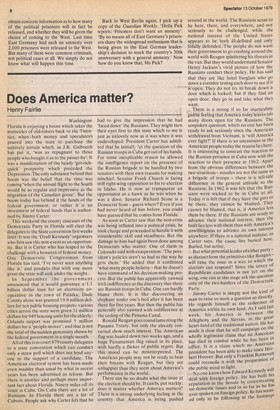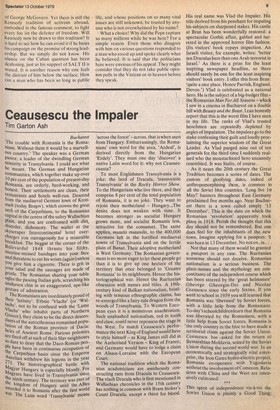Does America matter?
Henry Fairlie
Washington. Florida is enjoying a boom which takes the memories of old-timers back to the Twenties, when both money and speculators poured into the state to purchase the unlovely terrain which, as J.K. Galbraith has put it, 'was as repugnant to those people who bought it as to the passer-by'. It was a manifestation of the heady 'get-richquick' prosperity which • preceded the Depression. The only substance behind that boom was the belief that the time was coming 'when the annual flight to the South would be as regular and impressive as the Migration of the Canadian goose'. But the boom today has behind it the funds of the federal government, or rather it is an investment of federal funds that is authorised by Jimmy Carter.
This weekend the county caucuses of the Democratic Party in Florida will elect the delegates to the State convention five weeks later. It was the 'Draft Kennedy' organisers who first saw this non-event as an opportunity. But it is Carter who has leaped to the challenge with a bonanza of federal money. One Democratic Congressman from Florida has said, 'I've never seen anything like it,' and predicts that with one more grant the state will sink under the weight.
In Sepsember the government announced that it would guarantee a '1.1 billion dollar loan for an electricity cooperative in the town of Palatka; Dade County alone was granted 19.9 million dollars for ten public housing projects; various cities across the state were given 31 million dollars for 949 housing units for the elderly; Orlando airport was promised 5 million dollars for a 'people-mover'; and that is not the total of the sudden generosity shown by the federal government in a single month.
A llof this is to court 879 county delegates to a state convention which can conduct only a straw poll which does not bind anyone to she support of a candidate. The American electoral system has been made even madder than usual by what in recent years has been advertised as reform. But there is another and perhaps more important fact about Florida. Ninety miles off its .coast is Cuba. On Cuba there are a lot of Russians. In Florida there are a lot of Cubans. People ask why Carter felt that he had to give the impression that he had 'faced down' the Russians. They might turn their eyes first to this state which to me is just as unlovely now as it was when it was undeveloped. President Carter has admitted that he initialls !et the question of the Russian troops in Cuba get out of his hands. For some inexplicable reason he allowed the intelligence report on the presence of the Russian brigade to be handled by two senators with their own reasons for making mischief. Senator Frank Church is facing stiff right-wing opposition to his re-election in Idaho. He is now as transparent an opportunist as a hawk as he was when he was a dove. Senator Richard Stone is a Democrat from — guess where? Even if you had never heard of him before, you could have guessed that he comes from Florida.
As soon as Carter saw that the non-crisis was being inflated into a political crisis, he took charge and proceeded to handle it with considerable skill and steadiness. But the damage to him had again been done among Democrats who matter. One of them in Colorado said with exasperation. 'The president's policies aren't so bad as the way he gets them.' He added that it confirmed 'what many people believe —that he doesn't have command of his decision-making process. But the public has apparently yawned with indifference at the discovery that there are Russian troops in Cuba. One can hardly blame them. It is like discovering an elephant under one's bed after it has been there for five years. But then the public has generally also yawned with indifference at the ceding of the Panama Canal.
Ronald Reagan goes round lamenting the Panama Treaty, but only the already converted show much interest. The American flag was hauled down two weeks ago, and a huge Panamanian flag raised in its place, with hardly a flicker of Public regret. But this mood can he misinterpreted. The American people may not be ready to beat their breasts with Reagan, but they are unhappier than they seem about America's performance in the world.
There can be no doubt what the issue at the election should be. It can Ix put starkly: does it matter whether America matters? There is a strong underlying feeling in the country that America is being pushed around in the world. The Russians seem to he here, there, and everywhere, and not seriously to be challenged, while the national interest of the United States appears to be both ill-defined and only fitfully defended. The people do not want their government to go crashing around the world with Reagan spluttering his threats in the van. But they would understand Senator Henry Jackson's vivid picture of how the Russians conduct their policy. He has said that they are like hotel burglars who go down a corridor testing each door to see if it is open. They do not try to break down a door which is locked; but if they find an open door, they go in and take what they want.
There is a strong if so far inarticulate public feeling that America today leaves too many doors open for the Russians. The unspoken question, which no one has been ready to ask seriously since the American withdrawal from Vietnam, is 'will America ever fight?' If there is an uneasiness in the American people today the reason lies here. It is interesting to contrast the reaction to the Russian presence in Cuba now with the reaction to their presence in 1962. Apart from the obvious differences between the two situations— missiles are not the same as a brigade of troops — there is a tell-tale difference in the general attitude to the Russians. In 1962 it was felt that the Russians were wicked to be in Cuba at all. Today it is felt that if they have the guts to he there, they cannot be blamed. They cannot be blamed, that is, if America lets them be there. If the Russians are ready to advance their national interest, then the fault lies less with them than with America's unwillingness to advance its own interest anywhere. If there is a national malaise, as Carter says, the cause lies buried here. Buried, but active. But what potential leader ofeither party — as distinct from the primitives like Reagan — will raise the issue in a way to which the electors can respond? Since the covey of Republican candidates is not yet on the wing, one can at this stage ask the question Only of the two battlers of the Democratic Party. Jimmy Carter is simply not the kind of man to raise so stark a question so directly. He regards himself as the redeemer of America within its own land. As I said last week, his America is between the Allegheny and the Sierras, in the great heart-land of the traditional nation. He has made it clear that he will campaign on the wholly legitimate claim that no American has died in combat while he has been in office. It is a claim which no American president has been able to make since Herbert Hoover. But only a Franklin Roosevelt could reconcile it with the preparation of the public mind to fight. • No one knows how Edward Kennedy will deal with foreign policy. He has built his reputation in the Senate by concentrating on domestic issues and in so far as he has ever spoken on foreign policy, he has seemed only to be following in the footsteps of George McGovern. Yet there is still the Kennedy tradition of activism abroad, embodied in the famous comment, to fight every foe iin the defence of freedom, Will Kennedy now be drawn to this tradition? It is hard to see how he can avoid it if he bases his campaign on the promise of strong leadership. But we simply donot know. His silence on the Cuban question has been deafening, just as his support of SALT II is muted, It is another reason why one feels the distrust of him below the surface. How can a man who has been so long in public life, and whose positions on so many vital issues are still unknown, be trusted by anyone who is not overwhelmed by his name?
What a choice! Why did the Pope capture so many millions while he was here? For a simple reason. Even those who disagree with him on various questions responded to a man who stood up and spoke clearly what he believed. It is said that the politicians here were envious of his appeal. They might consider that they do not take public opinion polls in the Vatican or in heaven before they speak.



































 Previous page
Previous page